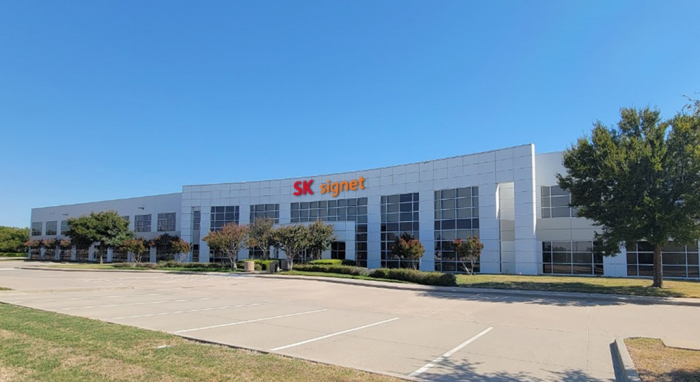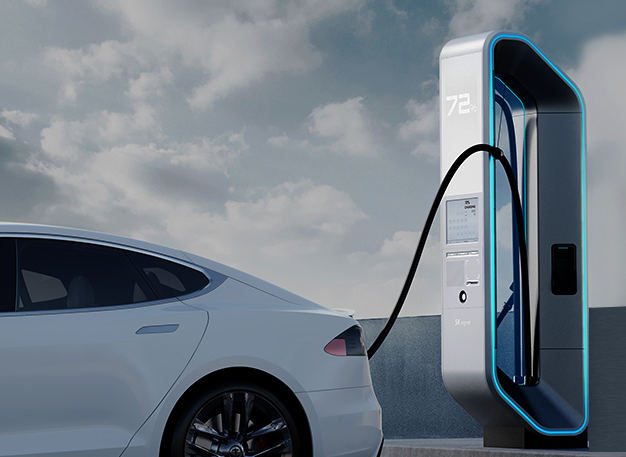Electric vehicles
SK Signet to build $15 million EV charger plant in Texas
SK, with the first charger plant built by a Korean company, aims to compete with Tesla’s Supercharger
By Oct 12, 2022 (Gmt+09:00)
1
Min read
Most Read
LG Chem to sell water filter business to Glenwood PE for $692 million


Kyobo Life poised to buy Japan’s SBI Group-owned savings bank


KT&G eyes overseas M&A after rejecting activist fund's offer


StockX in merger talks with Naver’s online reseller Kream


Mirae Asset to be named Korea Post’s core real estate fund operator



SK Signet Inc., a unit of South Korea’s second-largest conglomerate SK Group, said on Wednesday it will spend $15 million, or 21.3 billion won, to build an electric vehicle charger plant in the US state of Texas.
The company, which approved the investment plan at its board meeting, said it will eventually raise its spending to 50 billion won for the plant's ramp-up.
SK Signet said it would start installing equipment at the factory by the end of this year with an aim to begin mass production in the second quarter of next year.
With an initial annual production capacity of 10,000 chargers, the plant will be expanded later to produce as many as 20,000 chargers a year, said a company official.
Once established, it would mark the first EV charger manufacturing plant built by a Korean company.
The move comes as the US government is increasing subsidies for a speedy rollout of its charging infrastructure.

COMPETITION IMPOSSIBLE WITHOUT SUBSIDIES
Under the National Electric Vehicle Infrastructure Program (NEVI), the US government has allocated about $5 billion in subsidies to build a comprehensive charging infrastructure by 2030.
Washington plans to build 500,000 charging stations across the country by installing rapid or ultra-fast chargers every 80 km on its highways
The US government also provides subsidies to locally manufactured chargers through the Inflation Reduction Act (IRA).
Under the new law, makers of locally produced EV chargers can receive up to $100,000 per unit, up from $40,000 earlier.
“Given the US subsidies, you can’t operate an EV charger business without a plant in the country,” said an industry official.
While Australia’s EV charger maker Tritium has already built a production base in the US, Spain’s Wallbox and Switzerland’s ABB have also vowed to build US factories.
SK Signet, an EV charger manufacturing subsidiary of the group’s holding company SK Inc., currently produces about 3,000 EV chargers from a plant in Korea.
In the US, SK Signet accounts for about 50% of ultra-fast chargers sold by Electrify America (EA), competing with industry leader Tesla Inc.’s Supercharger.
Write to Hyung-Kyu Kim at khk@hankyung.com
In-Soo Nam edited this article.
More to Read
-
 Electric vehiclesEV tax credits may prove detrimental to the US: EU official
Electric vehiclesEV tax credits may prove detrimental to the US: EU officialSep 22, 2022 (Gmt+09:00)
2 Min read -
 Business & PoliticsWashington, Seoul to hold formal talks on US EV tax credit act
Business & PoliticsWashington, Seoul to hold formal talks on US EV tax credit actAug 31, 2022 (Gmt+09:00)
2 Min read -
 AutomobilesHyundai’s Chung rolls up sleeves to counter US EV tax credit act
AutomobilesHyundai’s Chung rolls up sleeves to counter US EV tax credit actAug 25, 2022 (Gmt+09:00)
3 Min read -
 BatteriesSK expands EV profile with Signet EV acquisition, Polestar investment
BatteriesSK expands EV profile with Signet EV acquisition, Polestar investmentApr 15, 2021 (Gmt+09:00)
2 Min read
Comment 0
LOG IN


